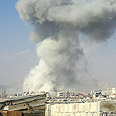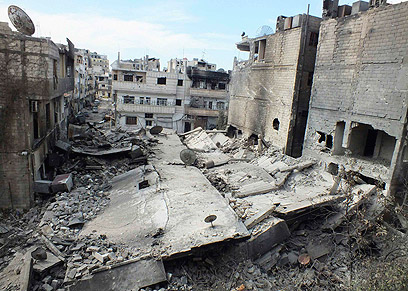
Activists: Rebels fight Syrian troops over airbase
Videos claim to show rebel vehicle firing rockets at Taftanaz air base, smoke rising over buildings. Syrian dissident: Alternative to regime is dearly needed
Syrian rebels launched a dawn assault Saturday on a strategic airbase in the north of the country, trying to disrupt strikes by warplanes and helicopters that pound rebel-held towns and give the regime of President Bashar Assad a major edge in the civil war.
The assault, reported by activists, comes a day before the start of a key international conference in Qatar at which the United States and its allies aim to reorganize the opposition's political leadership and unite their ranks. The leadership-in-exile has been widely seen as ineffective and out of touch with rebel fighters on the ground.
Rebels forces attacked the Taftanaz airbase early Saturday morning in fighting with government forces that continued into the afternoon, the anti-regime activist Syrian Observatory for Human Rights said.
Related articles:
- Syrian group: Heroic Iranian regime created Sandy
- Rebels believed to have executed Syrian troops
- Qatar PM: Syria war amounts to genocide
Joining Syrian rebels in the attack were fighters from Jabhat al-Nusra, an al-Qaeda-inspired Islamic militant group made up of foreign jihadis, according to the Observatory. Al-Nusra fighters, who are considered among the most experienced and disciplined among the opposition forces, have led attacks on other airbases in the north in past months.
The Taftanaz base mainly houses military helicopters, near the main highway between the capital Damascus and the northern city of Aleppo, where rebels and the military have been battling for control for months.
Online activist videos said the show the battle showed rebels firing rockets and smoking rising over buildings and a airstrip. An activist speaking in the video identifies it as an attack by rebels and Jabhat al-Nusra on the base.
The videos appear genuine and are consistent with other Associated Press reporting in the area.
Airstrikes have been one of the most effective and feared weapons of the regime in the civil war. Rebels managed to seize control of a pocket of territory around Aleppo, but government warplanes and helicopters continue to blast rebel-held towns from the air. In the fierce fighting over Aleppo itself, warplanes almost daily swoop in to strafe or bomb rebel-held neighborhoods.
Activists say more than 36,000 people have been killed during Syria's 19-month-old conflict, which began in March last year as a largely peaceful uprising but has transformed into a brutal civil war.
Several attempts for a truce in the fighting have failed, including the UN-supported four-day ceasefire that was meant to coincide with a major Muslim holiday last week, leaving the international community at a loss for ways to end the war.
US Secretary of State Hillary Rodham Clinton on Wednesday called for a major leadership overhaul and suggested Washington would handpick more representative leaders, including those fighting the regime. The opposition conference the Qatari capital, Doha, starts on Sunday.
Meanwhile, a formerly imprisoned dissident said the fragmented Syrian opposition will attempt once again this weekend to forge a common policy to gain international respect, obtain weapons and, most importantly, topple Syrian President Bashar Assad.
"An alternative to the regime is dearly needed," said Riad Seif, a liberal politician who is battling cancer and managed to leave Syria only a few months ago after having been imprisoned.
"We are talking about a temporary period that begins with forming a political leadership until a national assembly that represents all Syrians meets in Damascus, once Assad falls," Seif said in an interview with Reuters in Amman.
He spoke after talking to opposition figures in advance of a meeting of the wider opposition movement in Doha this weekend to form a united front to help end the 19-month uprising against Assad.
Divisions between Islamists and secularists as well as between those inside Syria and opposition figures based abroad have thwarted prior attempts to forge a united opposition.
On Wednesday, the United States called for an overhaul of the Syrian opposition's leadership, saying it was time to move beyond the Syrian National Council (SNC), the largest of the groupings abroad, and bring in those "in the front lines fighting and dying".
Clinton, signaling a more active stance by Washington in attempts to form a credible political opposition to Assad, said the meeting in Qatar would be an opportunity to broaden the coalition against him.
Unlike previous efforts that failed to come up with a unified leadership, Seif said the Doha assembly will be more inclusive, representing a myriad of religious and activists' groupings as well as more members of Assad's minority Alawite sect and Kurdish political leaders.
Among those Seif met in Amman was former Syrian Prime Minister Riad Hijab, who defected to Jordan three months ago and is playing a major role in the new effort led by Seif.
He also met with Suhair al-Atassi, an organizer of peaceful street demonstrations early in the revolt, and physician Kamal al-Labwani, a long-time political prisoner who is now an outspoken advocate for armed struggle.
"We have 10 million Syrians who need everything from housing to security to public services, and a regime we have to take every possible measure to remove to avoid more losses," Seif said, referring to inhabitants of areas under rebel control or where central authority had collapsed.
The charismatic 66-year old, who has been suffering from cancer for years, is one of Syria's most prominent dissidents.
Having been assaulted by Assad's security forces at a pro-democracy demonstration early in the revolt, he commands respect on the ground as well from opposition figures, whose bickering has undermined the rebellion and made Western and regional powers wary of recognizing the opposition.
While still in Syria, Seif was secretly chosen as a member of the Syrian National Council, which has come in for domestic and international criticism as being under-representative of activists on the ground and dominated by the Muslim Brotherhood.
After leaving Syria early this summer, Seif spent weeks receiving medical treatment in Germany before his condition improved and he began a concerted effort to bring together the disparate opposition groups.
An initiative bearing his name will form the basis of discussions at meetings starting in Doha on Sunday.
A previous large gathering in Cairo in July failed to appoint a committee that would have acted as the opposition's face to the world. But most delegates agreed that Assad had to be toppled and replaced by multi-party democracy. Seif said the Cairo documents remain the opposition's political manifesto.
He proposes the formation of a new, 50-member civilian group that will later choose a temporary government and coordinate with the military wing of the revolt.
He said the 50-member assembly will represent the "effective powers in the revolution" and "be convincing to the Syrian people", adding that efforts were being made to bring the rebels under a unified military command.
Western, Turkish and Arab recognition of the new opposition structure, Seif said, will help channel anti-tank and anti-aircraft missiles to the rebels and "decide the battle."
Seif said independent figures, such as Syrian intellectual Sadeq Jalal al-Azm, will be in the group to lend credibility. Representatives of opposition local councils that are providing services in Syria's 14 governates also will be on board.
Opposition sources said the success of Seif's initiative would depend on how much he can resist pressure from the SNC to put more of its members in the new assembly, and reach a consensus on how respond to international initiative to deal with what is increasingly becoming a Syrian civil war.
"There is already talk that most of the members of the new assembly will be from the SNC. If this turns out to be true then Seif's initiative may be doomed to failure," said an SNC member who has been advocating a more representative opposition.
Reuters, AP contributed to the report
- Follow Ynetnews on Facebook and Twitter
- Receive Ynetnews updates directly to your desktop











